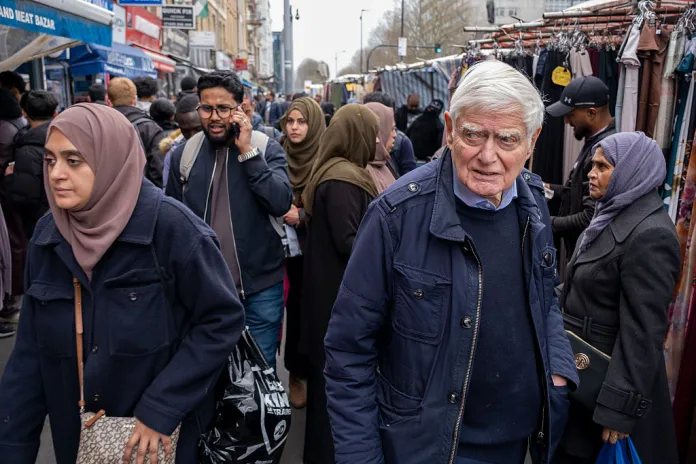


The biggest increase in popularity among male names in Britain in 2024 was for “Yahya.” There is, or was, only one world-famous Yahya: the late Hamas leader Yahya Sinwar. His name surged in the year bookended by Hamas’s rampage of murder, rape, torture, and kidnapping on Oct. 7, 2023, and his demise in the rubble of Rafah on Oct. 16, 2024.
There are 583 little Brits whose parents thought it a grand idea to name their newborn sons after one of the most evil men of our times. These infants are a living tribute to the mass murderer who offered his own people, the Arabs of Gaza, in mass sacrifice as a down payment on a caliphate. They are a political tribute to Hamas, the killers who violate every precept of law and decency and train children as “soldiers.”
Recommended Stories
- House Democrats would represent some of California's reddest realms under redistricting plan
- The Supreme Court's leap of faith
- How Cracker Barrel’s logo ordeal explains American politics
We could ask what kind of person names a baby after a monster such as Sinwar. But we already know. Britain has a serious Islamist problem — so serious that the government fears naming it.
Yahya blew up in 2024, jumping 33 places from 126th in the 2023 rankings to 93rd in 2024. Mohammed took the top spot among boys in 2024. It’s possible that not all 583 Yahyas are named because their parents idolize a torturer and killer. But it’s highly unlikely. There’s a long-standing historical correlation between admired leaders and baby names, and it runs across free and unfree societies. Consider the massed ranks of baby Winstons, who, like Winston Churchill, were bald, fat, napped in the afternoons, and spent their days in a jumpsuit.

Demography is destiny. It is also politics. The popularity of “Adolf” declined slowly in Germany from the 19th century until Adolf Hitler took over in 1933. Little Adolfs did big numbers until 1944, when the mothers of Germany could see which way the wind was blowing. Since then? Not so much. Germany’s defeat made life tricky for its legions of little Adolfs. Some dropped the name. Adolf Dassler, realizing that the nominal boot was on the other foot, called himself “Adi,” and went on to found Adidas.
After Boris Johnson’s election as Britain’s prime minister in 2019, the number of new Borises rose from 39 in 2019 to 43 in 2020. Johnson’s fall from office in 2022 damaged his brand and depressed his numbers. In 2023, there were only 16 Borises. We still do not know how many of these Boris-wave babies were personally fathered by Johnson, a man whose private life has attained a complexity last seen in the prime ministers of the Georgian era, or whether, as with the rest of his prime ministership, he outsourced the labor.
Not one of 2024’s baby Brits was named “Keir,” after Keir Starmer, the prime minister who was elected that year. That, too, sent a message. Starmer floundered from Day One. No honeymoon period, no babies.
Northern European countries, such as Germany, have lists of approved names. But then, the Germans have always liked lists. Germans are still allowed to call their babies “Adolf.” Mysteriously, few do. The ones that do choose “Adolf,” perhaps because they “just like the sound of it,” can be forbidden from combining it with a middle name that, who knows why, just seems to go well. Local registrars are allowed to refuse the registration of little “Adolf Hitler Schmidt” if they believe it will encourage extremism.

Even the officious British state would never maintain a list of approved names. Even if it did, it is too incompetent to enforce it. Britain, like the United States, trusts the free market in names, just as it has left integrating its immigrants to market forces. The market has, to use a loaded term, been flooded in recent decades with Muslim imports. The rash of little Yahyas is a symptom of Britain’s deep failure to integrate the fastest-growing segment of the population — and the wide, perhaps unbridgeable schism that this has created.
Usually, baby names are tributes to a nation’s leaders. Britain’s Yahyas are, however, symbolic of a wider sectarian challenge. The British are, to use another loaded term, noticing. The second-biggest jump in popularity for a boy’s name in 2024 was “Vinnie.” Not the French-sounding, and therefore effete-sounding, “Vincent.” Just “Vinnie.”
Just as there is only one Winston, there is only one Vinnie. He is Vinnie Jones. A hooligan soccer player notorious for impeding an opposing player’s progress by grabbing his testicles, Jones is also famous for portraying on-screen gangsters and other cutters of legal corners.
What’s in a name? A world of trouble. Britain’s demographic and political future is shaping up to be a faceoff between the Yayhas and the Vinnies. To get through that, the country will need more than a Winston.
Dominic Green is a Washington Examiner columnist and a fellow of the Royal Historical Society. Find him on X @drdominicgreen.
